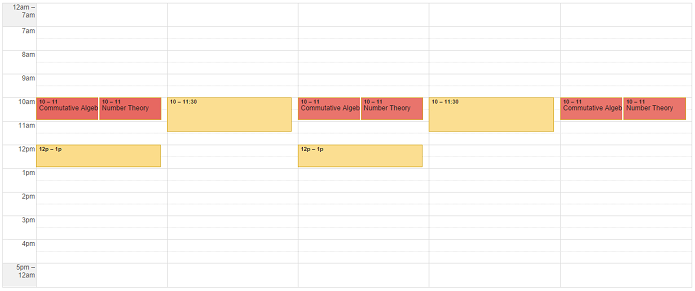Who goes to class, anyway?
To quote another another commentator today:
The Crimson has an op-ed on simultaneous enrollment that I agree with.
(That's Michael Mitzenmacher, blogging at his own My Biased Coin, whose own op-ed in response is also worth reading.)
I'll let Prof. Mitz do the explaining-of-background:
Harvard does not like simultaneous enrollment, which means a student taking two classes that meet at the same time -- any time overlap counts (whether the whole class or half an hour once a week). If you want to take a class via simultaneous enrollment, you have to petition the Administrative Board, and your professor is supposed to provide direct hour-per-hour instruction for the class you can't intend. As a previous Crimson article states:
The Faculty Handbook requires that "direct and personal compensatory instruction" for simultaneous enrollment, but only recently has the Ad Board refused to recognize videotaped lectures as a stand-in for class time.
The article references that for the past several years the Ad Board has accepted recorded lectures, under some additional conditions, as a suitable proxy for the direct and personal compensatory instruction. This apparently represented a change from their past position, and this last year, while I was on sabbatical, some Standing Committee on Education Policy decided to push back and say no more recorded substitutions.
Okay, so now it's a College requirement for every course that students pretend to be busy for three fixed hours every week, whether or not they choose to be physically in class. Never mind that students at the Extension School can earn credit towards their degrees for doing literally the same thing College students are now not allowed to do.
And if professors want to help students out here, they need to commit an extra (unpaid) three hours per week to "direct and personal compensatory instruction". Never mind that the baseline for instruction in large, lecture-hall courses (i.e. those affected by the video-recording simultaneous-enrollment rules change) is far from "direct and personal".
Actually, mind that last one. Does the following describe "direct and personal compensatory instruction"?
Student: (knocks on office door)
Professor: Come in. Yes, hello. As always, please no questions -- your TF will be able to answer them in section if you need. Let's get started. (presses play on a video queued up)
Professor (on screen): (in large lecture hall, to class) Yes, hello. As always, please no questions -- your TF will be able to answer them in section if you need. Let's get started. Today, we'll be discussing the... (1.5 hours pass) ...Again, your TFs will answer any questions in section, and homework is due Friday. (students gather notes and leave as video finishes)
Professor (in person): (looks up from doing work) Again, your TFs will answer any questions in section, and homework is due Friday.
Student: (gathers notes, leaves)
Is there a difference between sitting in a room watching a physical professor deliver a lecture by rote and sitting in a room with a physical professor, watching a video of the professor deliver a lecture by rote? In a previous Crimson article on the topic, Dean of Undergraduate Education Jay Harris is quoted as saying:
"Students are doing entire courses without ever stepping foot in a classroom... What we are struggling to articulate is that this is not what a residential college should be offering and this is not what a Harvard education should be."
But the problem is not that students are unable to step foot into a classroom because they're double-enrolled; it's that they're unmotivated to step foot into any classroom when it's not entirely clear why they need to.
Here's the thing: If you're teaching a class with <100 people with in such a way that the experience of physically attending lecture is indistinguishable from that of watching footage of the lecture in your office during office hours, you're probably doing it wrong. And the fact that the Ad Board feels the need to effectively-prohibit simultaneous enrollment by fiat, without any sort of conversation with students and faculty about the importance of student-professor and student-student interaction in a lecture setting seems to indicate that there's really no reason to, except that the SCEP doesn't like it when students ask permission to skip classes they were never going to attend.
So hear, hear, Dean Harris; lecture halls with one professor and a few silent students is not what a Harvard education should look like. But while you're busy talking to the faculty about that, could I please be allowed to take both Number Theory and Commutative Algebra this term? There's a course in Algebraic Number Theory I'd like to be prepared for next fall.

